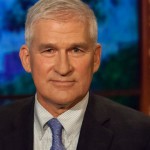
Aerial view of the Pentagon from the south parking lot.
In the midst of the controversies related to seating Joe Biden as the nation’s 46th president, all ten living former secretaries of defense have taken to the pages of the Washington Post to affirm unanimously that “there’s no role for the U.S. military in determining the outcome of a U.S. election.” Viewed from inside the claustrophobic bubble of Washington politics, Post editors have presumably performed a public service in providing space for these former senior officials to testify to their continued reverence for the Constitution.
That said, the opinions expressed by the authors – let us refer to them as the Pentagon 10 – have had no discernible impact on course of events in these perilous times. Nor will they. Even so, the assumption, apparently shared by the Pentagon 10 and editors at the Post, that their opinions should matter raises some interesting questions about the state of American politics.
Of course, everyone is free to express an opinion. The First Amendment of the Constitution may well be the ultimate guarantor of American liberty. So the Pentagon 10 have every right to have their say. Far be it from me to suggest otherwise.
But should ordinary citizens attribute any more value to their opinions than to the views of their hair stylist or the kid who (suitably masked) will deliver tonight’s pizza?
If, while holding high office, the Pentagon 10 had demonstrated notable wisdom and insight in the performance of duty, they might be worth listening to. Yet taken as group, they make for a pretty louche bunch.
Prominent among them is Donald Rumsfeld, who twice served as Pentagon chief. His first tour of duty, during the presidency of Gerald Ford, was brief and less than memorable. His second tour of duty, during the presidency of George W. Bush, proved to be very memorable indeed. With the possible exception of Robert McNamara during the Vietnam era, Rumsfeld was the worst defense secretary to hold that office since its creation. The catastrophic Iraq War did not lack for architects, promoters, and shills, but pride of place surely belongs to Donald Rumsfeld.
No one figured more prominently than he did in converting that misbegotten conflict into a full-fledged debacle. So, no thanks, Rummy, we don’t need you warning us that involving “the U.S. armed forces in resolving election disputes” could have “grave consequences” for our beloved country. Your professional legacy consists almost entirely of massively grave consequences: U.S. troops needlessly killed and maimed, along with trillions of dollars wasted. Please have the decency to keep it buttoned.
Among Rumsfeld’s enablers was another member of the Pentagon 10. Dick Cheney had run the Pentagon during George H.W. Bush’s presidency and had earned a reputation for being circumspect and at least minimally competent, if also dour. After 9/11, now elevated to the post of vice president, he emerged as an ideologue of the nuttiest sort, aggressively promoting a bogus doctrine of the “unitary executive” to remove constitutional limits on the scope of presidential power. For Cheney, that meant allowing the president to disregard international law, authorize (and lie about) torture, imprison indefinitely without even a nod toward due process, and engage in unlimited surveillance.
In Cheney’s view, the Constitution allowed whatever the inhabitant of the Oval Office deemed expedient. He thereby paved the way for Trump, who devised his own version of the unitary executive and proceeded to wreak even greater havoc on just about everything he touched. So, no, we don’t need Cheney weighing in about the sanctity of the constitutional order. Just go away, please, and stay gone.
As for the remaining eight of the Pentagon 10, don’t expect any of them to end up memorialized with a statue in the Dome of the Capitol. Few have left much of a mark. Some like William Cohen (defense secretary from 1997-2001) have long since been forgotten and deservedly so. In truth, only when I saw him on TV the other day did I realize that he is still among the living.
Others such as Mark Esper (fired by Trump late last year) served barely long enough to learn the ropes. Esper will go down as the Pentagon’s equivalent of President William Henry Harrison, who a month after taking office got sick and died.
That each and every one of the Pentagon 10 is by his own lights a patriot, not to mention a beneficiary of white male privilege, is undoubtedly the case. That each did his level best is also no doubt the case. Yet all accepted without question an assumption that has long formed foundation of U.S. national security policy: the conviction that the possession and use of matchless military might offers the best way to protect American freedom. In one way or the other, in other words, they were without exception warmongers.
The events of the entire post-Cold War era when the Pentagon 10 took turns in calling the shots from the E-ring calls that assumption into question. But it requires both gumption and imagination to think otherwise. When the Pentagon 10 held high office, those qualities tended to be in short supply.

